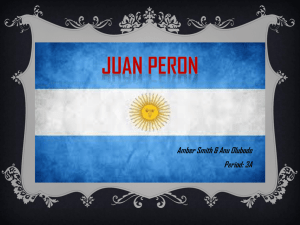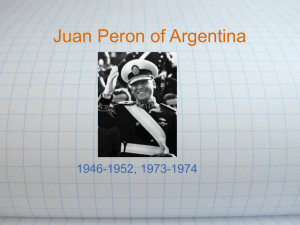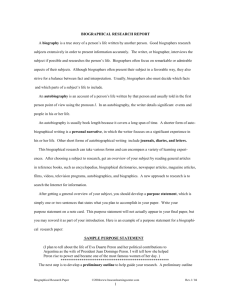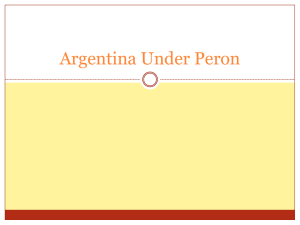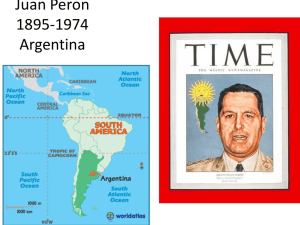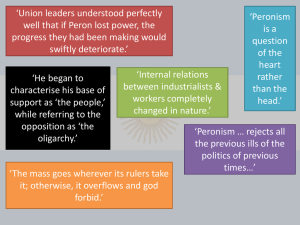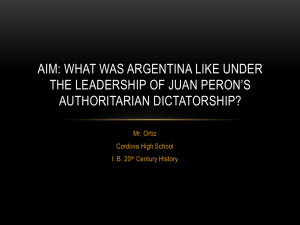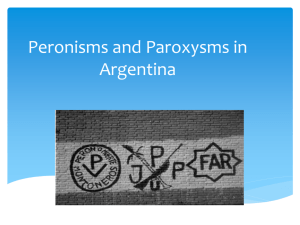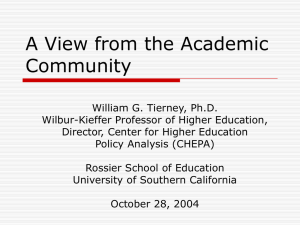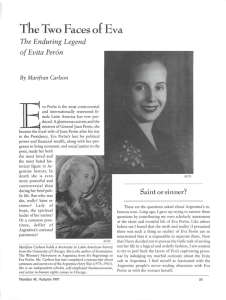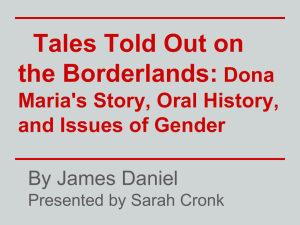The Legacy of Juan Peron - Mrs. Stratton`s IB 20th Century World
advertisement
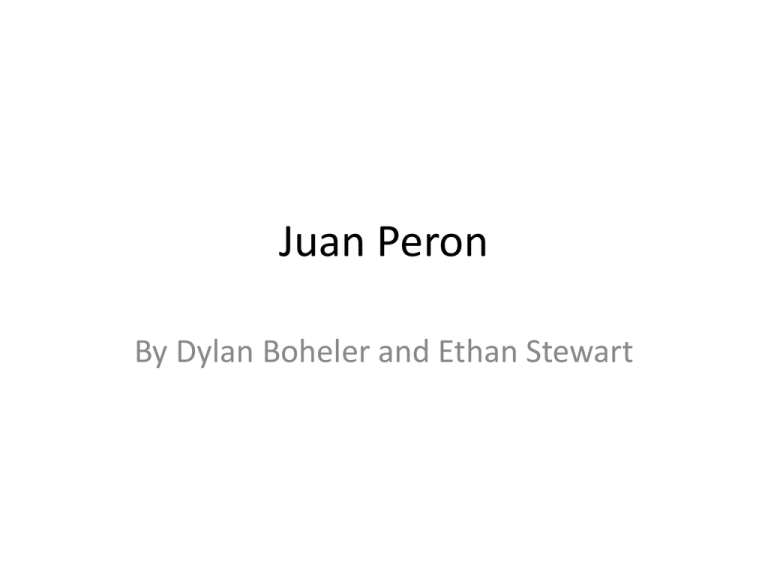
Juan Peron By Dylan Boheler and Ethan Stewart The Leader • • • • Juan Domingo Peron (1895-1974) Born in Buenos Aires to a lower-middle class family Joined the military at the age of 16 Juan stayed in Italy from 1938-1940 to study the fascist regime • He believed that neither liberal democracy or totalitarianism were viable options • He married Eva Duerte (Evita) in 1945 • Argentinian workers were Peron’s main power base The Leader cont… • His goals were to achieve social justice and economic independence for Argentina • Peron was anti-clerical • He sympathized with the Nazis and provided safety for many of them after World War Two, however he was not anti-Semitic The Historical Context • Peron avoided allying with either the socialist of capitalist cause • The US initially opposed Peron, claiming that he had fascist ties • Peron took power just after World War Two ended, and remained in power for much of the Cold War • Peron’s policies mirrored his belief that another world war was going to break out The Elimination of Opposition and Rule of the Regime • Peron participated in the military coup that overthrew the conservative president, Ramon Castillo • The police force was used to oppress Peron’s liberal opponents • Peron had complete control of Argentina’s armed forces • In opposition areas he restricted civil liberties • In 1949 Peron changed the Constitution so that he could be re-elected • He denounced any opposition as traitors The Elimination of Opposition and Rule of the Regime cont… • Peron bought out most Argentinian newspapers in order to weaken his opponents • Wages were increased for laborers • Extensive railroads were built in the country to help “nationalize” it • Thousands of hospitals and schools were built under his regime • Evita was used effectively for propaganda; her popularity along with her radio talk show helped raise support for Peron’s government Using the single-party state you researched as an example, speculate on the reasons for so many single-party states in the 20th century. Origins of single-party states • The middle class felt that their opinions were not being voiced effectively by the political leaders of Argentina. • The working class lacked organization and an understanding of the political conditions of the time. • Economic conditions as a result of the Great Depression led to political instability. Establishment of single-party states • Peron’s efforts while he was a part of the labour department of Argentina led to him being a respected Argentinian figure as he answered the demands of the common working class person. Rule of single-party states • Justicialismo- Ideology somewhere in between capitalism and communism. • Nationalistic Economic Policy- sought to gain international influence for Argentina. • Peron gerrymandered districts in Argentina in order to minimize the power of those who opposed his regime. • Persecuted his opposition through the use of jails and exile. Rule of single-party states cont. • Accomplishments of the Regime: - Universal social security and health care for workers. - Free education for those who fit the requirements. - Trade unions in all industries. - Low-income housing projects made vastly available. Regional and global impact • Even after the militaristic deposing of Peron, he still possessed a great number of supporters regionally due to he and his wife’s, Eva Peron, charisma and policies. The working class and youth both supported Peronist ideology. Bibliography • • • • Minster, Christopher. "Biography of Juan Peron." About.com Latin American History. N.p., n.d. Web. 06 Jan. 2013. "Juan Peron (president of Argentina)." Encyclopedia Britannica Online. Encyclopedia Britannica, n.d. Web. 06 Jan. 2013. "The Legacy of Juan Peron." The Legacy of Juan Peron. Colombia.edu, n.d. Web. 06 Jan. 2013. "Modern History Sourcebook: Juan Domingo Perón (1895-1974): Justicialism." Modern History Sourcebook: Juan Domingo Perón: Justicialism. Modern History SourceBook, n.d. Web. 06 Jan. 2013. • "Argentina, from Juan and Eva Peron to the Disappeared." Argentina, from Juan and Eva Peron to the Disappeared. Macrohistory and World Report, n.d. Web. 06 Jan. 2013. • Indij, Guido. "The Twenty Fundamental Truths of Justicialism by Juan Perón 1950." The Twenty Fundamental Truths of Justicialism by Juan Perón 1950. Creative Commons, n.d. Web. 06 Jan. 2013. • "Juan Peron." Politics - World People. MVUSD, n.d. Web. 06 Jan. 2013.
